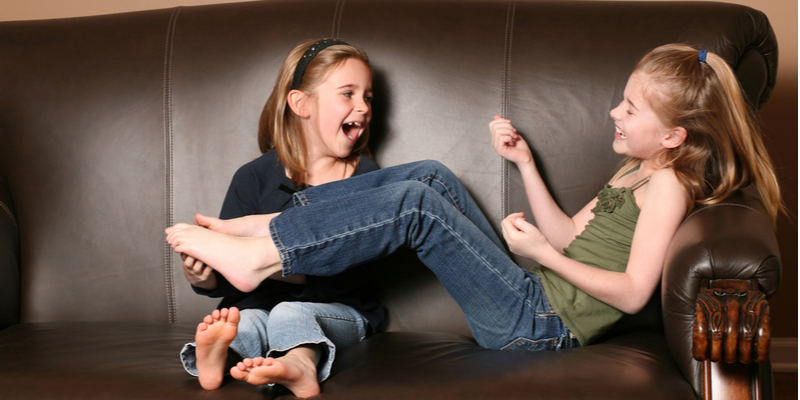Tickling a child is something most of us do because we like to hear children laugh. We assume that the laughter we hear when we touch the skin lightly is a sign of pleasure, but that may not be the case. Research suggests that for some, tickling is uncomfortable. The laughter that comes in response to tickling may be only a nervous reflex. Which begs the question: if you tickle a child and the child finds this uncomfortable, is it abuse?
When a parent tickles a child, our intentions are good. We’re just having fun. But tickle a child long enough and a child’s laughter can turn into tears. At that point, does tickling cross the line from fun to a kind of abuse?
Here we need to consider that tickling was an acceptable form of torture through the ages. In China, the Han Dynasty court used tickling to punish nobles, as tickling leaves no mark, and comes with the benefit of a speedy recovery. An ancient Roman form of torture consisted of dipping the feet in salt, then bringing in a goat to lick at the tasty treat. Kusuguri-zeme or “merciless tickling” was a popular form of torture in Japan.

Torture aside, tickling comes with a certain imbalance of power. The tickler is in control and has all the power; the one being tickled has none. The laughter caused by the tickling is uncontrollable—it stops when the tickling ends.
Then there is the matter of choice. Does the child ask to be tickled or does the tickling begin whether he likes it or not? What about when the child has had enough? He may be laughing so hard he cannot speak. If the child cannot speak, he cannot protest or ask for the tickling to stop.
In a study of 150 subjects, adults tickled by siblings as children reported the experience as a kind of physical abuse. The participants also reported extreme physical effects in response to tickling, such as vomiting and even loss of consciousness because the laughter made it so darned hard to breathe.

A 1997 study by the University of California at San Diego, as reported by the New York Times, suggested that most people don’t find tickling pleasant. It only looks as though they do, because they are laughing. ”Everyone has wondered why we laugh and smile when we’re tickled. It’s actually quite bizarre that someone rubbing their fingers up and down your sides or foot makes you laugh,” said researcher Christine Harris.
Harris found that the laughter brought on by tickling is a lot like when the doctor hits your knee with a little rubber mallet in just the right place and it makes you kick your leg. It’s a reflex. The person who is tickled, according to Harris, is not laughing because he’s having a good time. It only looks that way. In truth, he’s laughing because he can’t help it.
But not everyone hates to be tickled. Some people love it. How then do we explain the child who begs to be tickled? And how should we view that predilection?

For some children, says Dr. Carole Lieberman, who has served as a forensic psychiatrist and expert witness in child abuse cases; the pleasure taken in being tickled, is about being “comfortable with surprises, comfortable with their bodies.”
The author of Lions and Tigers and Terrorists, Oh My! How to Protect Your Child in a Time of Terror, Lieberman notes that the tickler, on the other hand, may misinterpret or be encouraged by the child’s laughter: “We laugh or smile as an automatic reaction to tickling, not necessarily because we’re enjoying it. This, unfortunately, gives the tickler the wrong impression, when, in fact, we aren’t enjoying it and want them to stop.”
That doesn’t mean that all tickling is bad. “The benefits of tickling children are to make them laugh just for the fun of it, as well as to distract them from a depressing or anxiety-provoking situation,” says Lieberman.

When does tickling become a problem? “If they don’t enjoy it and the tickling continues anyway, it has the potentially negative effect of making children feel as though they don’t have the right to have boundaries about who touches them and how,” says Lieberman.
Some children, it is clear, enjoy being tickled. Which is curious when you consider that for so many others, tickling is a kind of torture. Dr. Fran Walfish, Beverly Hills family and relationship psychotherapist, author, The Self-Aware Parent, and regular expert child psychologist on The Doctors, CBS TV, and co-star on WE tv is not surprised. “Tickling feels good to many people. I treat a number of young children who enjoy being tickled by their parents as a soothing, comforting way of falling asleep.”
“On the other hand,” says Walfish, “tickling can be painful to those who are exquisitely sensitive and whose neuro-receptors react with a pain response.”
Tickling: The Bottom Line
The bottom line? According to Walfish, it’s this: “When there are two people involved, it must feel good to both. If it feels good to you to tickle your youngster and it brings pain or discomfort to your child then you need to examine your own sadistic impulses. If your child asks you to stop, then STOP. You must respect your child’s word and voice with the same weight that you would from your spouse or anyone else you love.
Found what you just read useful? Why not consider sending a donation to our Kars4Kids youth and educational programs. Or help us just by sharing!

My siblings were born several months apart in the same year, several years before me. I can recall being tickled until I cried, or at least tears came to my eyes and urination was next.
During the same period in my life a parent was physically abusive when applying disipline… with hands, belt, hair brush, or whatever was at hand…years before I’d had my seventh birthday.
In many respects my life has been a mess, perhaps reflective of relationships established within my family, learning as children do… impulse control (or not) and appropriate behavior (or not).